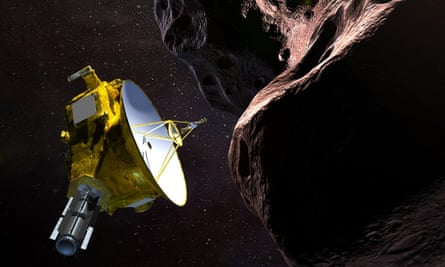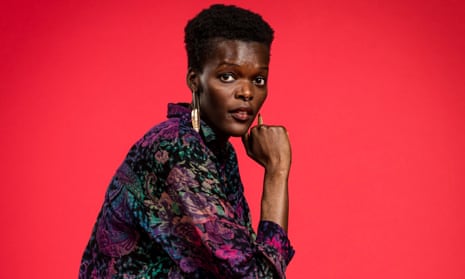The arts
Lovers of Shakespeare are invited to witness “a marriage of true minds” in early February when Kenneth Branagh and Judi Dench play Mr and Mrs Shakespeare on the big screen in Branagh’s All Is True. The screenplay, written by Ben Elton, follows the playwright’s return to Stratford-upon-Avon in 1613 after the Globe theatre burns down.
On stage, the pure-voiced Olivier award-winner Sheila Atim, who starred in Girl from the North Country, has written the music for Chè Walker’s Time Is Love/Tiempo es Amor which opens, with Atim starring, at London’s Finborough theatre in the first week of January.
Pitzhanger Manor & Gallery in Ealing, the Regency era country home of the architect Sir John Soane, reopens to the public in March after a £12m restoration project. Architecture will also mark 100 years since the founding of the Bauhaus movement with a book by Fiona MacCarthy about Walter Gropius, due this summer.
The astonishing notebooks of Leonardo da Vinci are to be gathered under the British Library’s roof in June, with his Codex Leicester on display for the first time in Britain since it was bought by Bill Gates. And, while the biggest drum roll in the gallery world this winter is reserved for the Van Gogh show arriving at Tate Britain in late March, a fresh take on another troubled painter comes out in print the same month when the Norwegian author Karl Ove Knausgaard launches his book, So Much Longing In So Little Space: The Art of Edvard Munch. On television, there will be a long-awaited second instalment of Phoebe Waller-Bridge’s tragicomic Fleabag, promised for BBC Two in the new year with the addition of Andrew Scott. Meanwhile, the men behind Sherlock, Mark Gatiss and Steven Moffat, are breathing life into a new creation, Dracula, for 2019.
At Covent Garden, the Royal Opera House sees a return of Richard Eyre’s staging of Verdi’s La Traviata. And American band the Flaming Lips have announced that their next album, King’s Mouth, out in April, will feature a liberal helping of the Clash’s Mick Jones.
Students of British music history await singer Tracey Thorn’s new memoir, Another Planet: A Teenager in Suburbia, published early in February. But before then bookshops will be piling up apocalyptic thriller The Last, by 28-year-old Hanna Jameson, which sold for a six-figure sum in America.
For the more poetic soul, novelist Joe Dunthorne’s debut poetry collection, O Positive, is out in April.
One to watch: Kieran Hodgson, the mercurial young actor/comedian who managed to beguile Edinburgh audiences last year by talking about the origins of Brexit. His hit one-man show, ’75, comes to London in January. VT
Technology
2019 could be the year Apple cements its reputation as the “new Microsoft” – a company with a massive valuation that has ceased to innovate. Iterations of the iPhone still account for the majority of its revenue, and with an entry point device costing £749, it feels increasingly like a company aimed at wealthy baby boomers. Throwing $100bn at next year’s revamp of Apple TV doesn’t feel like a new paradigm.
Moreover, despite some recent deals with Amazon to get its services on Alexa devices, Apple has fallen behind and priced itself out of the burgeoning market for connected gadgets and digital assistants. Google Home or Alexa-based devices are increasingly embedded in homes (and cars) and often don’t play well with iPhones.

Whether you are wired in to Apple, Google or Alexa has become like choosing a football team – you can only support one and it’s impossible to swap.
Meanwhile, Facebook will be hoping its declining popularity in Europe doesn’t turn into a stampede if the EU’s investigations about data sharing result in enormous fines, the advertising it is introducing to WhatsApp in 2019 doesn’t prompt users to join other messaging services, and the cloning of Instagram’s Stories format by Facebook and YouTube doesn’t divert revenue and readers to other platforms.
Well worth a read will be The Age of Surveillance Capitalism: The Fight For A Human Future At The New Frontier of Power by Shoshana Zuboff, a Harvard professor. At 704 pages, you’ll certainly have to throw away your phone so that you can concentrate on finishing it without any distractions, which is a start.
One to watch: Byte – Twitter bought then closed down Vine but that isn’t stopping the video looping network’s co-founder Dom Hofmann from launching a replacement. IT
Sport
The football year will pivot around the Fifa Women’s World Cup in France over the summer, with the USA favourites to retain their title, and England, Germany and France among the pack on their heels. Around the same time, an as-yet-undecided host will stage the Africa Cup of Nations. And, in Portugal, England’s men will hope to win the inaugural Uefa Nations League, a triumph that could yet signify the end of 50-odd years of hurt, depending on the current tournament exchange rate for agonising nostalgia.
The year in cricket will be dominated by the 50-over World Cup in England, followed almost directly by the Ashes, an epic-scale domestic double-bill that offers the summer game a chance to either dig its talons back into the national consciousness or confirm its own shift to the pay-TV periphery.
Then there’s the Rugby Union World Cup, a gruelling 42-day jamboree that kicks off in Japan at the start of September. New Zealand will be favourites because, well, they’re New Zealand. But Ireland and England will also fancy their chances.
Elsewhere, boxing will try to cash in on the sudden wealth of star power in the heavyweight division. The spring could see Tyson Fury and Deontay Wilder in an eliminator to face Anthony Joshua, creating in the process the greatest pay-per-view spectacle ever staged in the UK.
Beyond the pitch it seems likely that Football Leaks will continue to dish up further evidence of murky practice. And that Fifa’s entanglement with Qatar and the ineffectiveness of Wada and world doping authorities will continue to come into closer focus.

One to watch: Alexander Zverev. Men’s tennis really does need a new star. Time for the next-best next-biggest thing to start hoovering up the grand slams. BR
UK politics
1 January 2019 will – so the government says – be the last New Year’s Day that the United Kingdom spends as a member of the European Union. Both Theresa May and the Labour leader Jeremy Corbyn insist we must honour the result of the 2016 referendum and end our membership on 29 March. That is in just under 13 weeks’ time.
But whatever they say, the only thing that really is certain in British politics is that nothing is certain at all. Few new years have approached with so much up in the air. Much will be determined by what happens on Brexit – yet no one can be at all sure how Brexit will turn out.
Will it go ahead as planned, be delayed, or stopped in its tracks? With parliament deadlocked and a no-deal outcome looming into view, there is increasing talk of pushing back the date, or holding another referendum to break the impasse. The other possibility is another general election.
May clung on as prime minister before Christmas despite more than a third of Tory backbenchers in her deeply divided party saying they have no confidence in her. But, if she fails to get her own Brexit deal through parliament in January and if any of the three scenarios outlined above happen, it is hard to imagine how she could survive.
Labour, too, is divided on Brexit. For the first time since becoming leader in 2015, Corbyn is coming under fire within his party for refusing to oppose Britain leaving the EU and throw his weight behind a new public vote.
The centre ground, meanwhile, is wide open. Increasingly there is talk of discontented Labour and Tory MPs, perhaps backed by Liberal Democrats, forming a new centrist party from the political rubble left by Brexit.

One to watch: Amber Rudd. She is now back in the cabinet as work and pensions secretary. Although she is a strong Remainer, few are better placed to succeed Theresa May if she does not survive 2019 as prime minister. TH
The environment
The new year gets off to an ominous start with the inauguration on Tuesday of Brazilian president Jair Bolsonaro, who wants to accelerate mining and agribusiness exploitation of the Amazon, the world’s biggest rainforest. Scientific attention may also be focused on the Arctic, where meteorologists will be watching to see if last winter’s high temperatures were a one-off or a disturbing new trend caused by a weakened polar vortex.
If weather forecasters are correct, 2019 could also be another El Niño year, which means many parts of the world could also be in for another summer of heatwaves, droughts, hurricanes, coral bleaching and forest fires. This will be a crucial year to determine how fast humanity can respond to the growing threat.
On 23 September, the UN secretary-general António Guterres will convene a climate summit to urge government leaders to raise their emissions-cutting ambitions, followed on 11 November by the next regular conference of the climate talks, hosted by Chile. Environmental issues will increasingly shape and be shaped by politics. Buffeted by the gilet jaunes protests, the French president Emmanuel Macron has promised to put climate and biodiversity high on the agenda of the G7 summit he will host in Biarritz from 25-27 August.
If the fossil-fuel championing Donald Trump survives the arrests of his former aides, he is likely to push back against a new bipartisan climate bill and continue unravelling pollution controls for national parks.
In China, President Xi Jinping’s promise to create an “ecological civilisation” will be tested by the massive infrastructure investment of the Belt and Road Initiative. Globally, the big question will be whether emissions can finally start to fall after two years of rapid growth. If not, expect fiercer protests by groups such as Extinction Rebellion and 350.org.
One to watch: Greta Thunberg. In September the Swedish teenager began a solo climate protest by going on strike from school, and more than 20,000 students around the world have joined her.
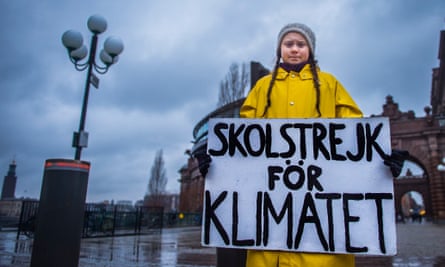
Who knows what she’ll do next – but you can be sure it’ll make the headlines. JW
Business
Forecasters have struggled to achieve a consensus about the prospects for 2019. The International Monetary Fund has warned that it could be a terrible year with much of the postwar financial infrastructure being torn apart.
Washington’s policy initiatives threaten to jam the cogs of international trade, making companies circumspect about pushing into new markets. Uncertainty over a Brexit deal, the US-China trade tariffs stand-off – which could escalate in the coming weeks after a 90-day moratorium ends – and the battles between Brussels and Italy’s new radical right administration also threaten the old order.
Since the 2008 crash, the west has relied on the emerging economies of China, India, Brazil, South Africa and Turkey to drive growth, but each is going through political upheaval and struggling to maintain momentum.
China, in particular, borrowed heavily from its own banks and the more shadowy elements of the financial sector to fund investment. After a crackdown on easy money, it’s not clear how strong the economy’s growth will be in the future. Yet the IMF, which failed to predict the last crash, stands accused of over-reacting to every morsel of poor economic news. Analysts at Oxford Economics are among many who predict 2019 as a period of steady if unspectacular growth. In this outlook, Donald Trump is more bluster than action, China gets back on track and British politicians will secure a deal or a delay for another referendum vote. The Italian government is already on the road to patching up its differences with Brussels. The worst is already in the past.
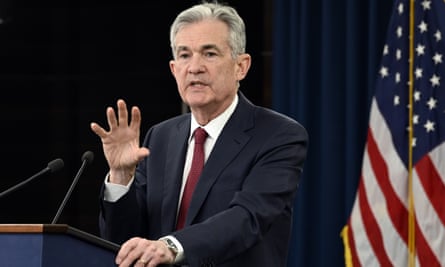
One to watch: Jerome Powell, the US central bank chief. If Fed rates continue to rise in 2019, money will be sucked into the US from across the world. Developing countries will struggle to find the funds they need to grow. Markets will become more volatile and global growth will slow. If Powell eases back, it will look like he has capitulated to Trump’s bullying, and the Fed’s independence will be in question. Whatever he does, it will have huge implications. PI
Geopolitics
Robert Mueller’s FBI inquiry into Donald Trump’s alleged collusion with Russia during and after the 2016 US presidential election is expected to conclude in 2019. A key question is to what extent Trump may have lied and conspired to obstruct justice.
Faced by similar accusations, Richard Nixon resigned in 1974, rather than be impeached. But Trump may try to brazen it out. Newly empowered Democrats in Congress will increase the pressure, just as the race for the 2020 election kicks off. Expect fireworks.
Europe faces great uncertainty. EU parliamentary elections in May may produce further gains for far-right populist and Eurosceptic parties. Key “mainstream” leaders such as Germany’s Angela Merkel and France’s Emmanuel Macron begin the year in a weakened state; the former has been replaced as leader of the CDU by Annegret Kramp-Karrenbauer. If there is no Brexit deal, April in Britain could be the cruellest month.
Bashar al-Assad’s vow to retake “every inch” of Syrian territory implies an all-out assault is coming on Idlib, the last hold-out province. Many Syrians in Turkey and Jordan appear poised to return home – if the war ends. But the unresolved problem of migrants travelling via north Africa will stoke tensions in Europe. The terrorist threat from Islamic State may intensify as it regroups in Iraq and the Sahel.
Efforts to halt the Saudi-Iranian proxy conflict in Yemen will be a race against time. The UN says millions face famine and disease. Much may depend on what happens to Mohammed bin Salman, the Saudi crown prince implicated in the murder of Jamal Khashoggi. The Ebola outbreak in the Democratic Republic of Congo shows signs of becoming an emergency. China will exploit the geopolitical vacuum caused by America’s distractions as trade tensions persist. Elections are due in India, Afghanistan, Indonesia, South Africa, Nigeria, Canada, Argentina and Israel.
Northern Syria, Taiwan, Venezuela, Cameroon, and Israel’s borderlands are likely 2019 hotspots. Russia-Ukraine enmities will cause more trouble.
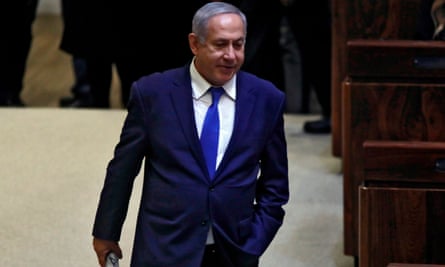
One to watch: Iran is in Trump’s cross-hairs, and he could escalate confrontation in 2019 to shift attention from his domestic troubles. Israel’s prime minister, Benjamin Netanyahu, is facing bribery and corruption allegations, and the Saudi leadership is under withering fire over Yemen and the Khashoggi affair. Both might welcome a chance to bolster their positions by settling scores with Tehran. If hardliners in Iran gain the upper hand and resume nuclear activities banned in 2015, the consequences will be unpredictable – and dangerous. ST
Science
The new year will begin in spectacular scientific style when the US probe New Horizons sweeps past the tiny world of Ultima Thule. It will have travelled 4 billion miles to reach the piece of rock about 20 miles in diameter, left over from the birth of the solar system 4.6 billion years ago. The data from New Horizons could revolutionise our understanding of planet formation.
Further space adventures for 2019 will include the launch of China’s Chang’e 5, a robot mission to collect rocks from the moon, while the US will return to putting humans in space when Elon Musk’s Space X company launches its manned capsule Dragon, and Boeing puts its CST-100 Starliner into orbit. Both will carry crew to the International Space Station. Next year should also see the results of efforts by scientists working on the Event Horizon project to produce images of the super-massive black lurking hole at the centre of our galaxy.
The chief medical officer, Sally Davies, has been instructed by Matt Hancock, the health secretary, to produce guidelines in the spring on the maximum time young people should spend on social media. Given the lack of research in this area it will be interesting to see what her recommendations will be.
One to watch: He Jiankui. The Chinese scientist shocked the world this year when he claimed to have created the world’s first genetically edited babies. He is now under pressure to reveal details of his work, which created an outcry because of the ethical questions it raises. RM
